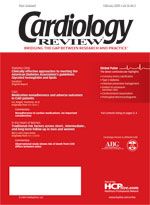Leading a horse to water and making it drink
In the current era, we have several drugs that are very effective in reducing morbidity and mortality in patients with cardiovascular diseases. These medications include potent antiplatelet agents, statins, beta blockers, angiotensin-converting enzyme (ACE) inhibitors, and angiotensin receptor blockers (ARB). Although these agents are individually very effective in reducing secondary cardiovascular events, they are even more effective when used in combination in patients with established vascular disease. Despite their strong and unequivocal benefits if taken properly, poor medication adherence may significantly limit the potential benefits of these agents.
In this issue of Cardiology Review, Ho and colleagues report that nonadherence to cardioprotective medications was prevalent among outpatients with coronary artery disease and was associated with a broad range of adverse outcomes, including all-cause and cardiovascular mortality, cardiovascular hospitalizations, and the need for revascularization procedures. They further state that these findings suggest that current quality-of-care measures should be expanded to include medication adherence assessment, which may be an especially important quality metric for patients with cardiovascular diseases. Their findings also show that there is a need for interventions to reduce medication nonadherence in clinical practice. In an accompanying commentary, Dr Ferdinand appropriately points out that medication that is not taken cannot be effective, and along with unraveling the mysteries of genomics and expanding breakthroughs in pharmacotherapy, expert care will only be accomplished through the appropriate education and support of medication adherence for each patient.
Interventions that may successfully improve adherence should include patient education and empowerment, patient reminders, frequent clinic visits, or telephone calls from staff or physicians. Every attempt should be made to simplify patients’ drug regimens by minimizing the number of pills required daily and by reducing medication costs wherever possible. Direct counseling of patients by pharmacists may be particularly promising because of pharmacists’ specialized training and knowledge of medications and their availability to patients. The effectiveness of such an intervention using pharmacists has been previously demonstrated where a pharmacy care program led to increases in medication adherence, medication persistence, and clinically meaningful reductions in blood pressure, whereas discontinuation of the program was associated with decreased medication adherence and persistence.
In another article, Berry and associates found some important sex differences in relative risk for several of the traditional risk factors across different periods of followup. The study suggests that the greatest increase in risk for cardiovascular death in women was in the early follow-up period and came from smoking and diabetes mellitus. This finding indicates that women who are diabetic or smoke require a more intensive prevention strategy, including counseling on smoking cessation and risk-factor modification, which should be aggressively targeted.
As part of our regular Diabetes Clinic feature, in part 1 of this report, Dr Davidson discusses strategies to achieve optimal glycemic and lipid control goals among diabetics. Achieving such targets will likely greatly reduce cardiovascular complications among these patients, and optimal control of blood glucose and lipid levels should be attempted in every diabetic individual.
I would love to hear from you if you have found strategies that are particularly effective in improving adherence to therapies or strategies to optimize diabetes control in your patients. You can e-mail us at editor@cardiology-review.com.
